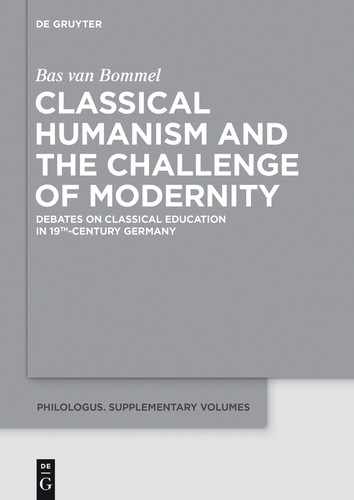Introduction
“Die [humanistische] Bildung war eine Provokation und mußte zur Auseinandersetzung her-ausfordern, die freilich diese Bildung nicht schwächte, sondern nur (…) stärkte.”
(Manfred Landfester, 1988)
The classical-humanistic ideal of education as outlined in the previous part of this book was so widely endorsed that it might reasonably be said to have been the dominant educational ideal in 19th-century Germany. Yet, for all its popularity, classical humanism faced some serious challenges at three different levels. Firstly, within classical studies an approach to the ancient world arose that deviated in important respects from the traditional approach propagated by humanists like Karl Gottfried Siebelis. From the last decade of the 18th century onwards, a group of leading academic philologists sought to transform classical studies into a so-called “science of antiquity” (Altertumswissenschaft). They aimed at an objective, historical reconstruction of the ancient world in all its facets, which replaced the traditional focus on a limited number of canonical texts. It is commonly assumed that this new ideal entailed a turn away from the exemplary perspective on classical antiquity that belonged to the essence of traditional humanism.231 A second challenge arose from outside classical studies, on the part of educationalists who endeavoured to develop an alternative form of education that focused not on classical, but on modern languages, as well as on what we nowadays would call ‘science subjects,’ such as mathematics, physics and natural history. Especially from the 1830s onwards, non-classical schools, called Bürgerschulen or Realschulen, were founded in great number next to the classical Gymnasien. The rise of these schools is usually seen to have unleashed a tiresome battle between “realists” and “humanists” that significantly reduced the scope of classical humanism.232
A third challenge originated entirely outside the field of education. Since the 1820s, many intellectuals held classical education responsible for the troubled political and social climate. Because the Gymnasien, these people argued, paid predominant attention to pagan literature, they obstructed the revival of Christian morality and religiosity needed to turn the tide. The Christian critique of classical education – a topic that has hardly received any serious attention in scholarship – is mostly seen as having posed a grave threat to humanistic education.233
The intellectual controversies around 19th-century humanism, then, are usually analysed in oppositional terms. On the prevailing view, humanists appear as a relatively small and clearly demarcated group of people struggling to defend their ideals in an increasingly non-humanistic climate, whereas the various groups of critics of the classical Gymnasien seem opponents of classical humanism. However, on close scrutiny, humanistic ideals and values were shared much more widely than is commonly assumed. Not only classical humanists, but also representatives of modern Altertumswissenschaft described their profession as “Humanitätsstudium” that would educate “the entire person” and yield an “exalted view of divine and human things.”234 Advocates of “realist” education did not grow weary of emphasising that the Bürgerschule or Realschule should not “deal with technology (…) but be an institution for Bildung (Bildungsanstalt), a Humanitätsschule.”235 Also Christian critics, who derided the classical Gymnasien for their allegedly pernicious, pagan influence, were quick to admit that “the persistence of a solid humanistic Bildung is no less dear to us than to people who rise against us in its interest.”236 Upon close examination, then, the intellectual controversies around early 19th-century humanism do not appear as simple confrontations between opposing camps, but as differentiated, constructive attempts to redefine humanistic values in their relation to modern society. Critics of the humanistic Gymnasium were not intent on combating humanism, but either on freeing it from its narrow focus on classical literature or on reintegrating to it values that it tended to neglect. Their aim was not to replace humanism with an alternative educational ideal, but to broaden its horizon by applying humanistic ideas and values in ways that vastly exceeded their traditional scope. Precisely the capability of classical humanism to adapt itself to contemporary needs and interests secured its survival until far into the 19th century.
